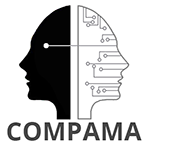About COMPAMA - COMPutational economics and optimization- Agents, Machines and Artificial intelligence
About COMPAMA

COMPAMA (COMPutational economics and optimization - Agents, Machines and Artificial intelligence) explore an emerging interdisciplinary area in the borderland between economics, optimization, psychology, machine learning and AI with the main purpose to understand the economic impact of decisions, made by both machines and human agents. COMPAMA seeks to develop a course program and exchange activities within this area, as well as new groundbreaking multidisciplinary research anchored in computational economics and optimization. The initiative is financed by The Research Council of Norway.
COMPAMA focus on application areas like energy markets, maritime transport, health care planning, and digital economy/finance. The main objective of is to further internationalize and strengthen the methodology of an emerging research area.
Among the interesting developments in economics the last years, we find on one hand increased focus on behavioural economics and how economic models are affected by human decisions and learning. Agent based modelling and behavioural economics present new opportunities to better represent human behaviour and decision processes into model based analytical frameworks.
On the other hand, we find machine learning and artificial intelligence (AI), that may affect markets and business models for example through digital platforms and machine-based agents participating in these, making it important to also understand decisions in a broader perspective. While these new developments have often been analysed as separate topics, we want through the COMPAMA education and exchange program to explore the interfaces between computational economics, behavioural economics, machine learning and AI.
This multidisciplinary approach may open potentially groundbreaking research areas. This is an emerging research area internationally where all these components are not often combined. Still, the linking of these methods is highly relevant in areas like energy markets (producer-consumer perspectives, machine/human interfaces in demand side management) and finance.
Management group
-
Rita Duarte Pimentel Associate Professor
+47-73412128 +4741305992 rita.pimentel@ntnu.no Department of Industrial Economics and Technology Management -
Stein-Erik Fleten Professor
+47-73591296 +4746694793 stein-erik.fleten@ntnu.no Department of Industrial Economics and Technology Management -
Peter Schütz Professor
+47-73593585 peter.schuetz@ntnu.no Department of Industrial Economics and Technology Management -
Asgeir Tomasgard Professor, Director NTNU Energy, Director NTNU Energy Transition Initiative
+4793058771 asgeir.tomasgard@ntnu.no Department of Industrial Economics and Technology Management


